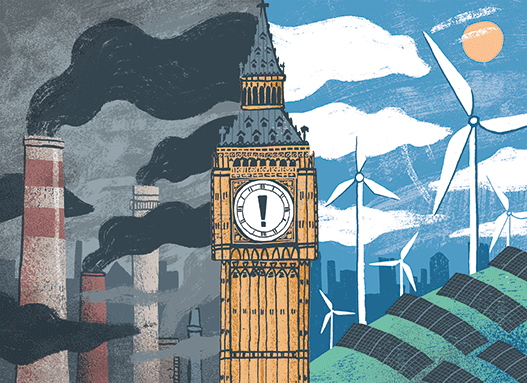I woke up today to the news from our chancellor that “most big UK firms and financial institutions will be forced to show how they intend to hit climate change targets, under proposed Treasury rules.” Similarly, a coalition of financial groups led by former Bank of England governor, Mark Carney, said that enough finance is committed to keep global warming to 1.5 degrees. To which I reply: “Oh, not again!”
Ever since the establishment of the East India Company in 1600, corporate law has developed with one simple end: to extract profit for (often distant) shareholders. That is the basis of modern global capitalism. It generates lots of good: wealth, comfort, medicines. It also generates some bad; most particularly, the environmental degradation stemming from a failure to value the common goods provided by nature. To enjoy the good, while dealing with the bad effectively, we must be honest: business, and most associated corporate law, has no moral compass.
This is not to suggest that there are not lots of good, moral people working within business – but the structures and incentives we have created over the past five centuries effectively silence their humanity in the workplace. Whether selling tobacco, asbestos, or now fossil fuels, history shows us how adept an unholy alliance of corporations, accountants, lobbyists, and PR firms can be in resisting state intervention that seeks to put public interest ahead of shareholder returns.
When intervention is inevitable, their tactics change from denial to delay, which is how I read these suggestions of corporate self-regulation coming from Glasgow.
The answer is so simple: stop denying the very nature of capitalism. Instead, use its strengths. Fossil fuels account for 89 per cent of global warming; make them more expensive, either through a tax on their sale, or through a carbon tax.
The extraordinary ability of business to unlock profitable innovations will ensure that we use less fossil fuels fast – leading to a 40 per cent reduction in greenhouse gases by 2030, according to OECD and IMF reports. The money raised by the tax could fund emerging green technology, and crucially, support those worst affected by the transition. This is the argument made more fully in my ‘Letter to Planet Earth’, written for COP26; those interested can read it here.
And for those of you who do not like receiving politics with your veg, I will go back to news from the fields next week.
Illustration by Tom Jay.
To read Wicked Leeks’ full coverage of COP26 and a climate special edition, look out for our next print issue, out 15 November.















I really appreciate your insight and on weeks when I’m away, or my allotment provides enough veg and I pause a box I purposely come here to read as I miss my weekly news. I totally agree with you here, environmental morality needs to find its way into the commercial and legal structure of business. The earth and its resource needs protection.
Fossil fuels are already too expensive. The price of gas has escalated causing many suppliers to go bankrupt. Inflation is increasing & the tax & NI changes next April will leave most of us less well off, especially those who are already poor. In the next few years we will all be expected to replace our petrol and diesel cars with electric ones. If we can’t afford it we’ll have to cycle or take the bus. How many buses will be needed to take us all to school & work? How long will it take to replace our gas boilers with less efficient electric ones & who’s going to pay for it?
Alas, fossil fuels are not nearly expensive enough if we want to have a planet to live in. Guy is absolutely right that using capitalisms strengths as a weapon in the war on climate change is essential and it is decades past due that politicians stepped up to their responsibilities here as capitalism by its nature isn’t going to do it for them.
Guy, I love to hear your views about the fields but also how the politics affect the farm business. So, please, rant about anything that takes your liking. Usually, it’s fascinating to hear your experienced view.
Hi Guy, just like to generally observe that I very much look forward to your newsletter. Whether its climate change, Brexit, or just something to do with carrots, you just seem to have a great way of getting to the heart of an issue in an engaging way.
So here is my idea for the week: All politicians to be forced to legislate on a single side of A5 – perhaps then they too would be forced to focus on what matters!
My husband is reading William Dalrymple The Anarchy. This morning he was saying exactly what you say in this article. How the formation of the East India Company marks the beginning of a corporate world economic system that still prevails.